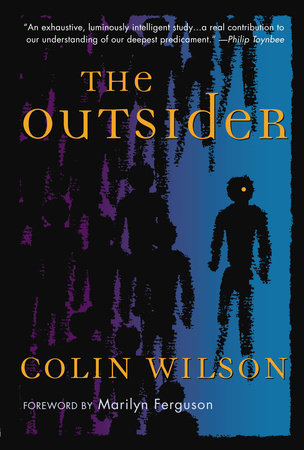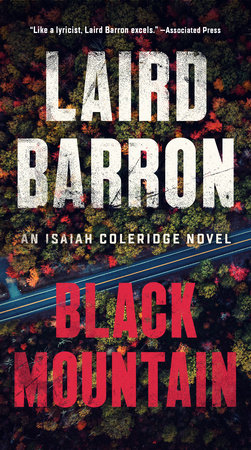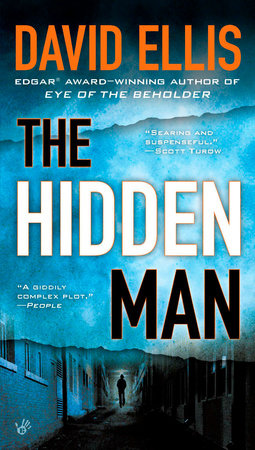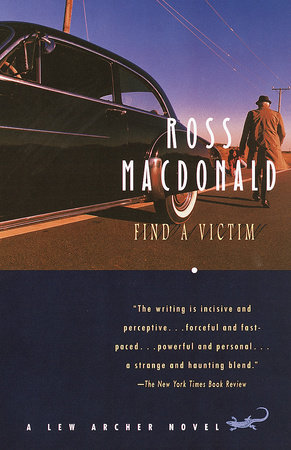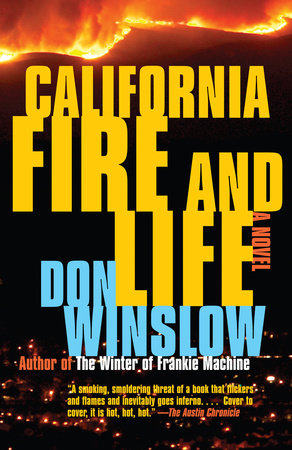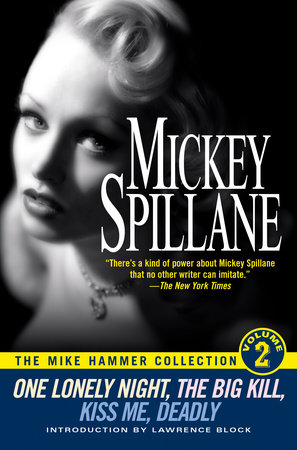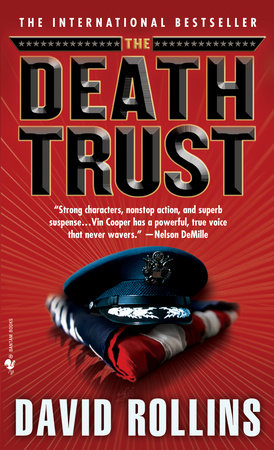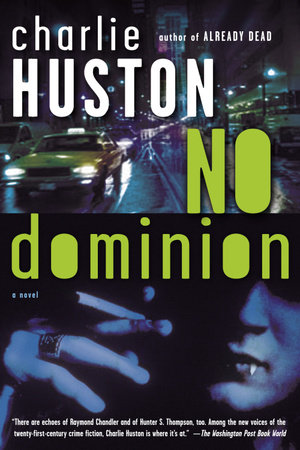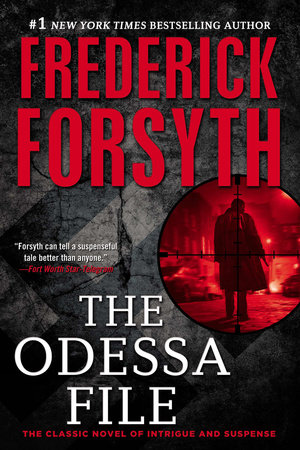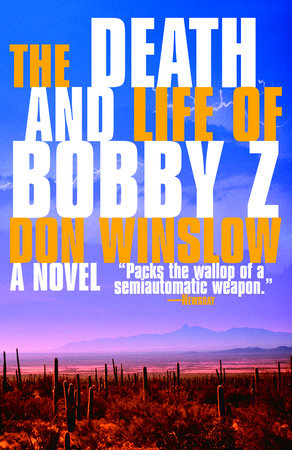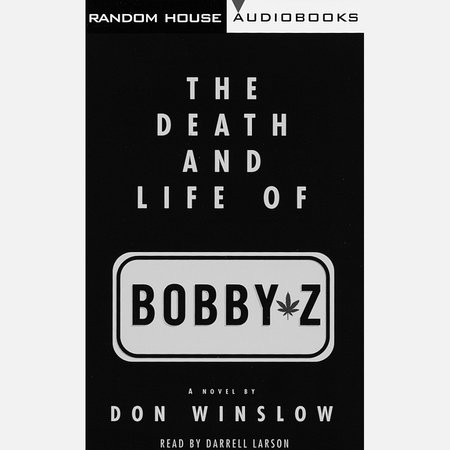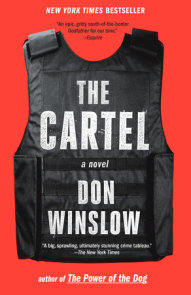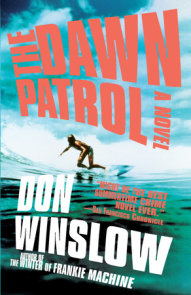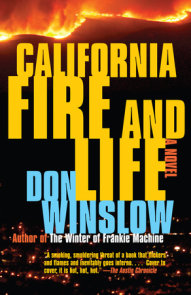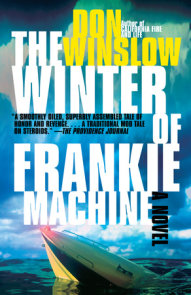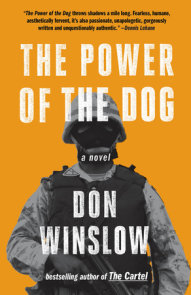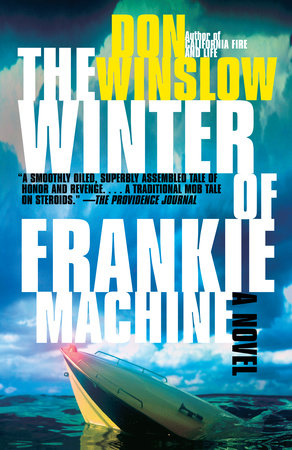Author Q&A
A Conversation with Don Winslow, author of The Death and Life of Bobby Z:
Q: Let’s see, you have been an actor, a theater manager, a journalist, and a cattle herder. You have been employed delivering salad dressing, managing movie theaters, acting as "a mock terrorist" and selling safaris. Currently you are working as a private investigator. How did that happen?
I was managing movie theaters in New York City and was basically fired for stumbling on some embezzlement. A few months later a friend took over the management of a chain of theaters on Times Square, thought he was being ripped off, and had his detective agency bring me in on an undercover basis. That case lasted about six weeks and then I just stayed with the agency.
Q: With all these careers, when have you found the time to write?
Yeah, it’s been tough at times finding time to write, but I’m so sick of writers whining about that so I’m going to try to resist. Bobby Z was written on a laptop computer on the commuter train between San Juan Capistrano and Los Angeles and was mostly written twenty minutes at a time. I’d read the New York Times and then start working. I’ve also written on legal pads on airplanes, in cars, and in hotel bathtubs.
Q: What are some of the most interesting cases you have worked on–that you can discuss, of course?
Generally speaking, and without naming names, the most interesting cases I’ve been involved in have been: A Hell’s Angels murder case in Nebraska–which is how I first became acquainted with the sorts of characters that appear in Bobby Z; the defense of a woman wrongly accused of killing a child–she was acquitted; an arson-murder in California; working with the widow of a retarded man beaten to death by an unnamed county’s sheriffs in their jail–she got 12 million dollars; and some pretty damn funny fraudulent theft cases out here in California.
Q: Do you find it difficult to work in a field where secrecy is such a big part of the job?
I don’t find it difficult at all. It’s just a habit by now. But you might want to ask my wife.
Q: Years ago, while working in South Africa, you were actually arrested and asked to leave the country. Did this brush with the law give you any ideas for your novels?
God, South Africa. A long time ago in a galaxy far, far away. I was too young, nineteen, and stupid to have learned much of anything about my arrest in South Africa. They first picked me up when I came into the country on a late night flight from Zaire. The next morning there was a cop following me. After about a half hour, I turned around and told him that as he had to trail me, and as I wanted to see Johannesburg, why didn’t he just show me around? So we spent the day touring the city and then he turned me over to my next tail on a train to Cape Town. Thus it went until they got bored with it. When some months later they decided they wanted me out they came to the door, told me to pack, took me to dinner and drinks, and put me on the plane. It wasn’t very heroic or dramatic.
Neither were my arrests in the People’s Republic of China, although I was old enough, thirty, by that time to be scared. I was arrested in rural Sichuan Province for photographing a bridge–hell, I just thought it was a pretty bridge. Unhappily, I had the phone number of the China International Agency written down under its initials, and it took me a long time to convince them that I wasn’t a spy, mostly by insisting that anyone stupid enough to carry around a phone number listed under CIA couldn’t get into the agency in the first place. Ah, the ever-effective idiot defense. Later I got picked up in Guanzhou for not having the right papers. But I did have the right amount of cash with me, so by emptying my pockets I got stamped and put on a train to Hong Kong. Lesson: Never fail to appreciate the venality of a third world border cop.
Q: Does your own experience investigating crime come into play anywhere in The Death and Life of Bobby Z?
I try to keep my own cases out of writing, hence the term private investigator. But I think my experiences come into play in terms of the characters. I don’t know a Bobby Z or a Tim Kearney per se, but I’ve spent a lot of time around a lot of criminals, cops, lawyers, etc. so I hope I get sense of them. What I try to get is not so much facts or dialogue, but an insight into a certain ambiance of thought and speech. What I enjoy about sociopaths is that, by definition, they fail to make the normal mental connections and this is reflected in the way they act and speak. This makes for fun writing and–gulp–hopefully fun reading.
Q: In Bobby Z, the main character, a career criminal, cuts a deal with the feds that gets him out of prison. What do you think about criminals cutting deals with the government?
I’ve yet to discern any real distinction between the government and the criminals.
Q: Are criminals smarter than the cops?
I don’t think so. The criminals who are smarter than cops are the criminals you never hear about.
Q: Did you do any special research before you began writing Bobby Z?
I tramped around the desert a lot. My wife, Jean, and son Thomas were usually with me and we’d take three and four day trips out to Anza-Borrego and go on hikes. Jean and Thomas would sketch maps for me and take pictures while I took notes. So most of the research had to do with the terrain. Otherwise, in research, I would often find myself reading about chapters I had written in the next week’s newspapers. Shortly after writing the early chapters, I read long articles about the ‘new’ people’s smuggling route through east San Diego county. Later on, I had the same experience in regard to northern Mexico drug lords. In terms of research, I think the essential thing is just keeping your eyes and ears open. Research is happening around you all the time.
Q: Warner Brothers has purchased the film rights to Bobby Z. Are you nervous about how your novel will translate into a movie?
I’ve read the screenplay, by Henry Bean, and I like it a lot. Lauren Schuler Donner, the producer, has a great sense of the story and the characters. Richard Donner’s directing the thing. They’re a class act and I’m delighted to be involved with them.
Q: As someone who writes about crime and also investigates crime in your everyday life, can you offer any insight as to why Americans are so fascinated by crime stories?
I think crime stories are sort of life writ large. They have all the elements of real life, but it’s a life where the rules are off–at least for some characters–and I think that’s appealing on a certain level. Also, I think that people are frustrated with real crime, and crime stories provide an element of control: the good guys more or less win, the bad guys more or less lose. What I’ve found fascinating lately is that you can’t write fiction that keeps up with the headlines. As real life gets weirder the distinction between it and crime ‘stories’ blurs.
Q: Do you think your own attraction to crime has anything to do with having been born on Halloween?
Gosh, maybe. Although it probably has more to do with being born on Halloween in New York City.



